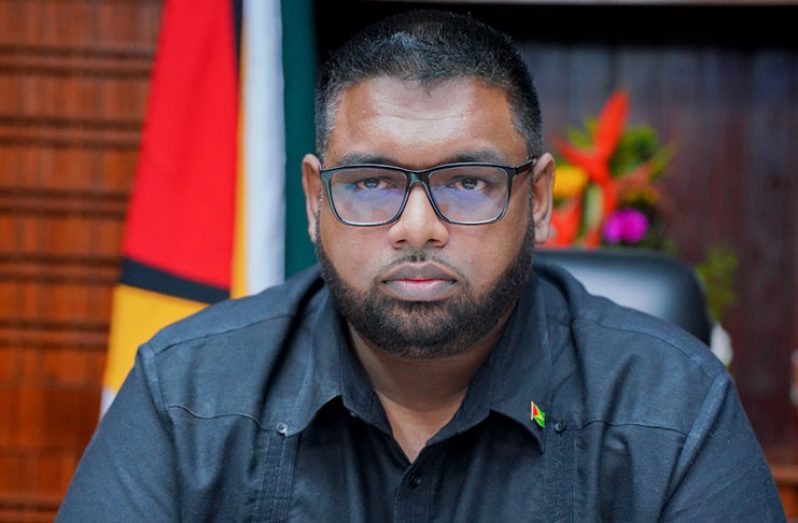– as stakeholders join hands to navigate the challenges of Small Island Developing States
By Vishani Ragobeer
THE reliance on data and evidence-based approaches to development in specific contexts must be used to facilitate the development of Guyana and other Small Island Developing States (SIDS), according to President, Dr Irfaan Ali.
This past week, stakeholders from countries across the globe participated in a Virtual Island Summit which sought to discuss the challenges SIDS faces and their progress towards achieving the United Nations (UN)’s Sustainable Development Goals (SDGs). President Ali delivered remarks at the opening of the Eastern Hemisphere Session recently.
It was at this forum the Head of State indicated that several critical lessons were learnt from the voluntary review on Guyana’s progress in implementing the SDGs, done in 2019. Chief among these lessons was the importance of data systems, which Guyana has not yet mastered. In fact, he highlighted that a challenge for Guyana is inadequate data to support planning, policy formulation, and targeted intervention.
Strong data systems, he explained, promote development by ensuring “strategic and evidence-based interventions” and the absence of these creates difficulties in planning and projection.”
To remedy this, the President highlighted, “We will undertake a systematic analysis of our data management system, including data collection and analysis through the public service to identify critical areas of strengthening.” In doing so, he expects data-driven and evidence-based policy decisions and directions, instead of “ad-hoc” actions.
At this forum too, President Ali noted that while Guyana is not an island state, it is a small state which is susceptible to the effects of climate change, natural disasters, and exogenous economic shocks. The country, he noted, is constrained by small markets and a plethora of social issues.
“The 2030 Agenda for Sustainable development provides a framework to ensure that economic transformation results in social transformation, leading overall to the development of welfare of all people of Guyana,” he said.
Furthermore, he posited that the intersection of economic development and human development should be focused on by all SIDS. This should include a focus on improving healthcare, education, social justice, security, and poverty reduction, all of which are outlined in the SDGs.
“Guyana has begun the process of aligning the SDGs (with) its developmental agenda. We remain wedded to these goals as part of our national development agenda,” he said, but noted that the current COVID-19 pandemic and the constant threat of climate change inhibits progress in the SDGs.
ACCESS TO FINANCE

Another major challenge affecting Guyana and other Caribbean SIDS is access to finance for developmental purposes. SIDS often seeks funding from multilateral organisations such as the World Bank and the International Monetary Fund (IMF) for developmental projects within the nations.
However, President Ali highlighted that the inherent grouping structures of these organisations constrain development; as countries begin to develop, they move to higher statuses; from low-income to developing to developed. He explained that when capital injections are made and the economy begins to develop, the country “graduates up the ladder.”
“While this might sound attractive to policymakers and leaders, there are implications because we are starting from a different starting point and access to concessional financing and grant resources becomes an issue,” he bemoaned.
Prime Minister of St. Vincent and the Grenadines, Ralph Gonsalves, also a speaker at this forum, also addressed further concerns of SIDS in the global multilateral system. He reasoned that the trajectory of development pursued by the global superpowers is not applicable or even conducive for SIDS which contends with threatening vulnerabilities because of their “smallness” and “debilitating legacy of history.” Moreover, SIDS are even more vulnerable to climate change and the resulting onslaught of exacerbated natural disasters.
GLOBAL EXCLUSION
“On top of all these shackles of development is the cruel design or evolution of the contemporary global political economy which inhibits and undermines the developmental thrust and indeed the very viable existence of SIDS,” Gonsalves bemoaned.
Though SIDS are exceptional because they have been able to survive thus far, he lamented the exclusion of the small, developing states in the design of the global political economy.
In order to contend with the unique challenges, Gonsalves posited that global partnerships must be established, with much alacrity, with positions for SIDS in the multilateral global system as well. This, he affirmed, must not merely be discretionary treatment but rather, a commitment that must be embedded in international law.
“The SDGs are unlikely to be achieved without a global partnership,” the Vincentian prime minister said plainly.



.jpg)








